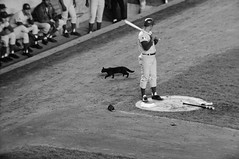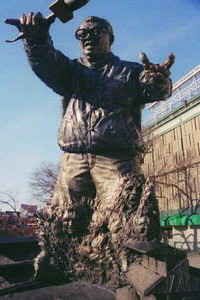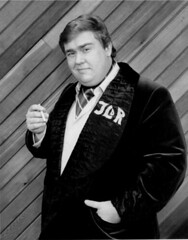 “It’ll go north of $800 million, and I wouldn’t be surprised if it went for more than $1 billion,” says Marc Ganis, a Chicago-based sports industry consultant.
“It’ll go north of $800 million, and I wouldn’t be surprised if it went for more than $1 billion,” says Marc Ganis, a Chicago-based sports industry consultant.
“It” is the Chicago Cubs. “It” is up for sale. And “it” is less a baseball team than marketing juggernaut, and has been for some time.
The Tribune Co., erstwhile owners of the Cubs, are selling their media empire to a Chicago real estate magnate while jettisoning the team at season’s end. Given their roster and wise moves to boost the payroll, it appears the 2007 Cubs are on track to win 36 games, and the smart money says that volatile manager Lou Pinella will register more burst aneurysms than destroyed water coolers this season.
It’s not that my beloved Cubbies aren’t worth a lot of money, in a business sense: Tribune owns the stadium, part of a cable network, and the team generates over 3 million loyal sheep-fans every year. Perhaps shelling out $1 billion for the team will be a good return on capital. (It certainly will be for Tribune, which bought the Cubs for $20 million in 1983.)
But no amount of fiscal reasoning can hide the fact that the idea itself is galling. Paying $1 billion for the Cubs? This is like paying $1 billion for a company that recycles used toilet paper. This is like paying $1 billion to masturbate before a live television audience. This is like paying $1 billion for the Bad News Bears.
Curse my ass
For someone like myself, it is a double insult. Not only have the Cubs constantly ripped out my heart and treated it like a clay pigeon, but think of what good the money could have done in the world of fiction.
$1 billion will get you 10,000 book advances of $100,000 each, or 20,000 advances of $50,000. Now let’s do some analysis here.
Out of 20,000 novels, about 80 percent will sell for shit, 15 percent will do a fair business, and perhaps five percent will be hits, with 0.5 percent being blockbusters. That means 100 books will be major sellers, and if one does not recoup the $1 billion investment, at least there is the satisfaction of launching a young or (middle-aged) writer (like me) on his road to retirement.
Now, let’s look at the Cubs. While you’d get 100 blockbuster novels from $1 billion, that same amount is buying a team that hasn't won the World Series in 100 years. It hasn’t even won a pennant in 62. You can get 20,000 books or a single, sorry franchise that proudly markets the Curse of the Billy Goat.
This penchant to wildly overpay for an asset is what is formally known in the business world as “fucking insane.”
If it seems that I am passionate and angry about this topic, you would be right. And it doesn’t even have to do with the fact the Cubs have disappointed me more than a stereotypical Jewish son disappoints his mother.
A columnist recently noted that back in the early 1980s — when I was a high-schooler living in the Chicago suburbs and frequent attendee of Cubs games — Wrigley Field and its surrounding environs were considered eyesores at best, slum-like at worst. There was nothing hip or cool about going to a game, and the working-class neighborhood the ballpark sat in was as grey and uninviting as standing on the Addison Street “L” stop in January.
By the time I had moved to Chicago as an adult in the early 1990s (and living only blocks from Wrigley Field), everything had changed. Going to games became less about the game than “hanging out at Wrigley” or visiting a baseball “shrine.” Attendance exploded, largely due to a mass infiltration of fools.
Two things had happened: the Cubs won the division title in 1984, and the Cubs went national, through the cable superstation WGN, which broadcast most of the Cubs’ games. Suddenly, yuppies were moving into the newly christened “Wrigleyville” neighborhood (the fuddy-duddy “Lakeview” no more) and baseball-ignorant tourists were flocking to visit.
Then, Harry Caray, a once-brilliant, Hall-of-Fame announcer with the Cardinals who had gone to pot with the Cubs, became a legend, singing “Take Me Out to the Ballgame” each seventh-inning stretch, spreading the gospel of Wrigley Field to a national audience, and ending one season with the unheard of average of 2.29 BPI (Beers Per Inning), a record that stands beside Joe DiMaggio’s 56-game hitting streak as one of the “unbreakable” records in baseball.
Caray: roll out the barrels
The transformative nature of what happened — the asinine “loveable loser” tag became a marketing ploy rather than a state of affairs — is really one of the great American business stories of the past 25 years. Going to the ballgame became a trip to an amusement park. The Cubs, though coming close a couple of times, never made it to the World Series, lost far more games than they won, let their ballpark crumble, and yet became one of the most “successful” franchises in all of sports. It’s marketing brilliance like none other. They succeeded by sucking.
It’s almost enough to make you watch cricket.
Thursday, April 05, 2007
$1 Billion for Each World Series Win
Labels: beer, Cubs, publishing, writing
Subscribe to:
Comment Feed (RSS)


|